Öz
Child abuse and conflicts within the family have become significant risk factors for emotional and behavioural problems among children and adolescents (Haggerty, Sherrod, Garmezy, & Rutter, 1996; Turner, Finkelhor, & Ormrod, 2006). On the basis of extensive reports, trauma occurred during childhood has been argued to have the ability to affect children’s psychological development and adjustment seriously (Cicchetti, Ackerman, & Izard, 1995; Cloitre, Miranda, Stovall Mc Clough, &Han, 2005). Maltreatment victimization, for instance, especially during adolescence or beginning in childhood and persisting into adolescence, is an expected cause of subsequent perpetration. Therefore, developmental theories sustain that what occurs early in the life has a significant importance for later development. The aim of this study was to investigate emotion clarity as an indicator of emotional awareness, trait anger and depression levels of abused adolescents. Five hundred sixty four high school students (262 females, 302 males) completed Childhood Trauma Questionnaire (CTQ), Trait Meta Mood Scale (TMMS), Trait Anger and Anger Expression Inventory (STAXI) and Beck Depression Inventory (BDI). Among five hundred sixty four students, 175 students (96 female, 79 male) were found to be abused by their parents through CTQ. The differences between trait anger and depression levels of abused and non-abused adolescents were analysed. The results showed that there is a significant difference between emotional clarity, trait anger and depression levels of abused and non-abused groups.
Anahtar Kelimeler
Kaynakça
- Arias, I. (2004). The legacy of child maltreatment: Long-term health consequences for women. Journal of Women's Health, 13, 468–473. Beck, A. T. (1967). Depression: Clinical, experimental, and theoretical aspects. New York: Harper & Row. Beck, A. T. (1974a). Assessment of depression: the depression inventory. Pharmacopsychiatry, 7, 151-169.
Öz
Kaynakça
- Arias, I. (2004). The legacy of child maltreatment: Long-term health consequences for women. Journal of Women's Health, 13, 468–473. Beck, A. T. (1967). Depression: Clinical, experimental, and theoretical aspects. New York: Harper & Row. Beck, A. T. (1974a). Assessment of depression: the depression inventory. Pharmacopsychiatry, 7, 151-169.
Ayrıntılar
| Birincil Dil | İngilizce |
|---|---|
| Bölüm | Makaleler |
| Yazarlar | |
| Yayımlanma Tarihi | 31 Aralık 2020 |
| Yayımlandığı Sayı | Yıl 2020 Cilt: 5 Sayı: 2 |


